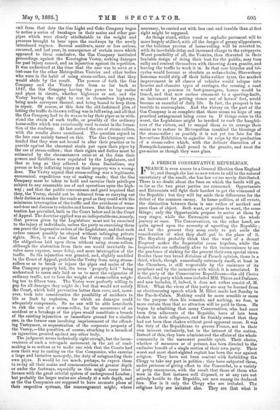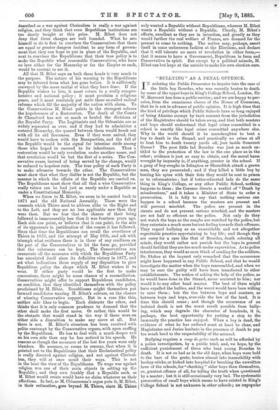A FRENCH CONSERVATIVE REPUBLICAN.
FRANCE is even nearer to a General Election than England is ; and though she has no new voters to add to the natural uncertainty of the result, she has her vo'ers newly distributed. There is no doubt about the lines on which the battle will go, so far as the two great parties are concerned: Opportunists and Extremists will fight their hardest to get the command of the Republic ; but they will lay aside their differences for the defeat of the common enemy. In home politics, at all events, the distinction between them is one rather of method and pace than of object. Both want, or profess to want, the came things ; only the Opportunists propose to arrive at them by easy stages, while the Extremists would make the whole journey at once. The Conservatives, on the other hand, are quite agreed upon the necessity of upsetting the Republic ; and for the present they seem ready to put aside the consideration of what they shall put in the place of it. The Royalists probably think that the want of a decent Emperor makes the Imperialist cause hopeless, while the Imperialists are sufficiently alive to this inconvenience to see the prudence of sinking for the present their own special views. Besides these two broad divisions of French opinion, there is a third, which, though numerically extremely small, at least in the Chambers, is still respectable by the eminence of its members and by the memories with which it is associated. It is the party of the Conservative Republicans—the old Centre Gauche, the party which once included MM. Thiers and Dufaure, and now includes, if, indeed, it does not rather consist of, M. Ribot. What the views of this party are may be learned from an electioneering speech which M. Ribot made last Sunday in the Pas-de-Calais. Nothing could be more sensible or more to the purpose than his remarks, and nothing, we fear, is more certain than that no attention will be paid to them. He began by admitting that many Conservatives, who had once been firm adherents of the Republic, have of late been shaken in their allegiance, and he frankly owned that they had not been thus shaken without good apparent cause. It was the duty of the Republicans to govern France, not in their own interest exclusively, but in the interest of the nation. Instead of this, they have administered the affairs of the whole community in the narrowest possible spirit. Their choice, whether of measures or of persons, .has been directed to the exclusive benefit of a single section of their own party. Their worst and most short-sighted exploit has been the war against religion. They have not been content with forbidding the Clergy to take any part in politics ; they have subjected them, under pretence of giving effect to the Concordat, to a variety of petty annoyances, with the result that those of them who were in the first instance well disposed, or at any rate not actively hostile to the Republic, are now among its declared foes. Nor is it only the Clergy who are irritated. The religious laity are irritated also. They see that what is described as a war against Clericalism is really a war against religion, and they think that even Republican institutions are too dearly bought at this price. M. Ribot does not deny that these charges are well founded. What he sets himself to do is first to convince the Conservatives that there are equal or greater dangers incident to any form of government that they can hope to put in place of the Republic, and next to convince the Republicans that their true policy is to make the Republic what reasonable Conservatives, who have no love either for the Monarchy or for the Empire as such, would be content to see it.
All that M. Ribot says on both these heads is very much to the purpose. The nature of his warning to the Republicans may be inferred from what has gone before. It is sufficiently conveyed by the mere recital of what they have done. If the Republic wishes to live, it must return to a really comprehensive and national policy ; it must proclaim a religious peace, and it must resolutely put aside those so-called radical reforms which fill the majority of the nation with alarm. To the Conservatives M. Ribot paints in the strongest colours the hopelessness of a Restoration. The death of the Comte de Chambord has not so much as healed the divisions of Vie Royalist Party. The Legitimists and the Orleanists are as widely separated as ever, and if they had to administer a restored Monarchy, the quarrel between them would break out with all its old fierceness. Even if they were united, they would have to reckon with the Bonapartists, and the fall of the Republic would be the signal for intestine strife among those who hoped to succeed to its inheritance. Thus a restoration would be only revolution under another name, and that revolution would be but the first of a series. The Conservative cause, instead of being served by the change, would be reduced to hopeless ruin. The true policy of each Party is to make advances towards the other. The Conservatives must show that what they dislike is not the Republic, but the manner in which the affairs of the Republic are carried on. The Republicans must show that all that a wise Conservative really values can be had just as surely under a Republic as under a Constitutional Monarchy.
When we listen to M. Ribot, we seem to be carried back to 1871 and the old National Assembly. These were the counsels which Thiers used to address alike to the Right and to the Left, and they are no less applicable now than they were then. But we fear that the chance of their being followed is immeasurably less than it was fourteen years ago. Each side can point, or believes that it can point, to the acts of its opponents in justification of the course it has followed. Since that time the Republicans can recall the overthrow of Thiess in 1873, and the attempt of May 16th, and ask with triumph what evidence there is in these of any readiness on the part of the Conservatives to let the form go, provided that the substance can be kept. The Conservatives can enumerate all the measures with which the Republican Party has associated itself since its definitive victory in 1877, and ask what indications these supply of any disposition to give Republican policy the shape which M. Ribot wishes it to wear. If either party would be the first to make concessions, there might be some chance of a reconciliation. Conservatives might offer to support Republican candidates, On condition that they identified themselves with the policy proclaimed by M. Ribot. Republicans might themselves put forward candidates wearing M. Ribot's colours, on the chance of winning Conservative support. But in a case like this, neither side likes to begin. Each distrusts the other, and thinks that it is only common prudence to demand that the other shall make the first move. Or rather, this would be the obstacle that would stand in the way if there were on either side a disposition to make any move at all. But there is not. M. Ribot's eirenicon has been received with polite contempt by the Conservative organs, with open scoffing by the Republican. He has to deal with a much deeper evil on his own side than any he has noticed in his speech. He reasons as though the measures of the last few years were only blunders. He assumes, or seems to assume, that when it is pointed out to the Republicans that their Ecclesiastical policy is really directed against religion, and not against Clericalism, they will at once mend their ways. This is not in the least the view of the Republicans. To wage war against religion was one of their main objects in setting up the Republic ; and they own frankly that a Republic such as M. Ribot would create would have no claim whatever on their affections. In fact, as M. Clemenceau's organ puts it, M. Ribot, in their estimation, goes beyond X Thiere, since M. Thiers only wanted a Republic without Republicans, whereas M. Ribot wants a Republic without a Republic. Clearly, M. Ribot's efforts, excellent as they are in intention, and greatly as they would further the real welfare of France, are doomed for the present to come to nothing. The nation may, perhaps, assert itself in some unforeseen fashion at the Elections, and declare that it will tolerate no more of revolution in either form,— that it means to have a Government, Republican in form and Conservative in spirit. But except by a political miracle, M. Ribot can but hope at the outside to make his own election sure.



































 Previous page
Previous page